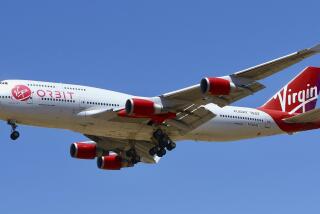Hughes to Buy Western Union Satellite Unit
- Share via
Hughes Aircraft agreed Wednesday to buy Western Union’s communications satellite system, a move that would more than double the number of non-military communications satellites owned by Hughes.
The price was not disclosed. However, Al Casazza, an analyst with Moody’s Investment Service in New York, estimated that Hughes agreed to pay between $100 million and $200 million.
According to investment analysts, Western Union has been trying to sell its troubled satellite system for several years. Last year, the company, headquartered in Upper Saddle River, N.J., took a $106-million writedown on the system.
Fulton S. Holmes, an analyst with Thomson McKinnon Securities in New York, said Western Union had identified communications satellites as a no-growth business. He said satellites are expected to lose a significant amount of business to the fiber optics cable networks now under construction by the nation’s long-distance telephone companies.
Weakened Satellite System
Long-distance telephone firms are one of the biggest users of satellite transmission. However, Holmes said, broadcast and cable television, which are also important users of the satellites, are dependent on satellites since fiber optic cables cannot transmit video signals.
Hughes, a Los Angeles-based aerospace firm, is buying a weakened satellite system. Western Union has three satellites in orbit, but one has lost much of its usefulness because it is out of 1718969708Union has been unable to launch its fourth satellite because the explosion of the space shuttle Challenger early last year forced a delay in rocket launches.
Stephen J. Petrucci, president and chief executive of Hughes Aircraft’s Hughes Communications unit, said in a telephone interview that Western Union’s satellites will give Hughes a greater ability to generate fees through “spot” sales of transmission capacity.
Hughes and other satellite operators usually sell their capacity to such customers as MCI Telecommunications and collect fees for maintaining the satellite. When customers have capacity they cannot use, satellite operators broker the capacity for a fee. Petrucci said that sports and news programing are large buyers of “spot” satellite capacity. Recently, MCI, Hughes’ biggest satellite customer, made its own arrangements for selling unused time, Petrucci said. As a result, Hughes lost a large source of fee revenue.
Hughes has three communications satellites that are nearly identical to three of Western Union’s four satellites. Besides the three communication satellites, Hughes has three others that it leases to the U.S. Navy.
Casazza, the Moody’s analyst, said the sale helps generate badly needed cash for Western Union. The telecommunications firm was rescued in December from possible bankruptcy in a financial reorganization led by New York investor Bennett S. LeBow. Western Union said previously that it was reorganizing its businesses and planned to sell its transmission network.
The sale must be approved by the Federal Communications Commission. Petrucci said he expects to close the deal later this year.
More to Read
Inside the business of entertainment
The Wide Shot brings you news, analysis and insights on everything from streaming wars to production — and what it all means for the future.
You may occasionally receive promotional content from the Los Angeles Times.










